Former Minister of Foreign Affairs of Abkhazia, member of the Supreme Council of the WAC, Doctor of Philology, Professor Viacheslav Chirikba told about the problems of preserving the Abkhaz language, the goals and objectives of the WAC, and his vision of the work of the Congress.
Member of the Supreme Council of the WAC, ex-Minister of Foreign Affairs of Abkhazia, well-known philologist Viacheslav Chirikba gave an interview to the WAC web information portal, in which he shared his vision of the problem of preserving national languages and ways to solve it, spoke about the role of the Congress in this process and, in general, in unification of Abkhaz-Abaza ethnic group in the world.
Interviewed by Said Bargandzhia.
- Viacheslav Andreevich, in one of your interviews you said that the Congress is working so that the Abkhaz-Abaza people “do not dissolve in the face of globalization, but preserve their language and culture”. Please tell us more about the role of the WAC in the preservation of the ethnic group.
- The World Abaza Congress is an organization uniting all Abkhaz and Abaza living in the world, the main tribal nest of which, of course, is Abkhazia. The main Caucasian ridge separates Abkhaz and Abaza, who mainly live in Karachay-Cherkessia. The sea divides us and the Abkhaz-Abaza Diaspora of Turkey. There are our brothers in Syria, Jordan, Egypt, America, Australia and European countries. This huge, in our scope, diaspora, needs to be linked together into a single organism.
And our main goal is to preserve the unity of the people. The Abkhaz-Abaza people are a single ethnic group, we have a single language. It is necessary to bind us, all generations, and, in the face of globalization, which cycles through everyone, including big nations, to preserve our ethnic face, to preserve the main values of traditional culture, to be able to pass them on to our children. This is the main goal of our work, I think.
- How to reach it? What role can and should the Congress play in the issue of unity of representatives of the Abkhaz-Abaza Diaspora?
- Today there are new means of communication, the Internet. Of course, globalization itself is also a powerful mechanism of communication between people from all over the world. I think that all this should be used in order to maintain contacts, strengthen them, create platforms, groups that would gather, including according to professional interests. We need to meet at various cultural events. All this can be organized even across continents, and it is better, of course, to communicate in person. Such meetings are held in Abkhazia, and in the KChR, and in Turkey. I hope that when the situation in Syria and Jordan stabilizes, meetings will be held there.
The main goal of our ethnos is to preserve the ethnos itself. The demographic aspect plays one of the most important roles. We are few, and the fewer we are, the weaker we are. There should be more of us, we should be stronger as an ethnic group.
The second aspect is the language, the Abkhaz language, the Abaza language, our common Abkhaz-Abaza language. We split up somewhere in the Middle Ages, but still maintained mutual understanding. The situation [in terms of language preservation] is threatening. Changing it is also one of the goals of the World Abaza Congress.
- It is known from historical experience that people most often repeat the fate of their language: language disappears - then people disappear. We often hear that the Abkhaz language is lost. How close is it to reality?
- We see the example of the Ubykh language. Ubykhs are a people related to Abkhaz and Circassians who lived in Sochi, not far from us. They are already not there, the language is not there, only the ancient names of places remained. But even in Turkey, where there are many Ubykhs, about 15-20 thousand, no one knows the Ubykh language.They [only] know separate words. I have been to almost every village. This, of course, is a very sad example.
Unfortunately, there is a tendency that other related languages, Abkhaz and Abaza, first of all, can follow [Ubykh]. For example, the situation with the Kabardian language is much better, because they speak it more, but in Adygea, the situation with the native language is also quite complicated.
We did a study that showed a sad picture. In primary schools in all schools of Abkhazia from Gagra to Tkuarchal and Ochamchira, and in all urban kindergartens, the number of children who know their native language is no more than 30 percent. What does this mean? This means that parents do not pass on their knowledge, although they know the language very well. Most parents do not pass the language on to children, since they believe that they no longer need it. That is, the state language in Abkhazia is no longer needed by the Abkhaz. This is a paradox, a tragic paradox.
After 20 years, these children will grow up, and it will turn out that most Abkhaz will no longer speak the Abkhaz language. We will have to travel around the villages, as we are now looking for some storytellers, to find those who know the Abkhaz language well.
- Is there a danger that in the relatively near future the Abkhaz language may cease to sound forever?
- This is a real prospect for the Abkhaz language, if nothing is done now. We have 10-15 years to change the situation. We can still turn everything back. There are examples in the world when language programs were carried out very successfully, and the situation improved significantly. The language even begins to expand back to those areas where it has already become extinct. This happened in Basque Country, Catalonia and Wales.
Unfortunately, [in Abkhazia] the acute question is how effective are the actions of our official structures, the Ministry of Education, for example. I know very few people who have learned the Abkhaz language in an Abkhaz school. Mostly they [only] forget it there.
For example, my children knew the Abkhaz language very well before kindergarten. In kindergarten, they became “bilingual,” that is, they actively began to speak Russian, and in the Abkhaz school they became monolingual and stopped speaking Abkhaz. This means the failure of the entire education system of the Abkhaz language. Failure! And the most amazing thing is that everyone resigns to this, [although] there is a whole Ministry. I'm not talking about today, this is the situation of the last 20 years. Everything is very inefficient, very outdated, but people have neither the desire nor the knowledge to change the situation. They look at children who speak only Russian for the most part, and they are perfectly fine with this. I believe that the state language should be essentially state. We also have the Law on the Abkhaz language, which was entered into force in 2015 and which everyone violates. I am convinced that the current education system in the Abkhaz language is outdated, hopelessly outdated, it no longer meets the [modern] needs.
- How can we change the situation? What can be done?
- It is necessary to create a new methodology and a new education system in the Abkhaz language. Several groups are currently working on this issue. We study the experience of foreign countries, including those that I spoke about. I think that if several programs on the Abkhaz language in kindergartens, in elementary schools and in high schools are prepared, if to introduce them first at the experimental level, then at the national level, then we can say that the fate of the Abkhaz language has become more promising. The same goes for the Abaza language, of course.
The problem is that children who go to kindergarten or school, even knowing the language well, are faced with the fact that their peers do not know their native language. Therefore, they switch to the majority language, that is, to Russian.
Apparently, at some stage it will be necessary to create separate groups - those who know and do not know the language. Those who do not know are taught the state language from scratch, like foreigners. There is no other way. That is, at some stage [to implement] two methods, and then all this should merge into a single program for teaching the language. In general, the Abkhaz language should be the language of the Abkhaz state - parliament, the presidential administration, senior officials, documentation.
- How do you see the way to preserve the Abkhaz language through the work of the Congress?
- I think that the Congress can help a lot, since it unites people from all over the world in practice. I think the Congress can play a big role considering its experience, very progressive one, its connections and contacts. In particular, in terms of financing of some programs. This is already happening, and hopefully will continue to take place.
If we understand this task as a national one, as the task of all Abkhaz and Abaza, then preserving our native language will certainly succeed. And if we act spontaneously, perform some [only] targeted actions, then, I think, nothing will work. The problem is systemic, complex, it requires funding, great efforts, large teams. If it’s all organized, and it’s possible and even necessary to organize, then we will succeed.
- It is believed that in the Abkhaz language many words have been lost that have been preserved in the Abaza language, and vice versa. Is it so? If so, then perhaps the unification of the alphabet would be one of the factors in preserving our languages?
- The time when both Abkhazia and the KChR the Abkhaz and Abaza used the Latin alphabet and font was the Soviet era, then we had a single alphabet. This went on for about 10 years, then the Abaza language was transferred to the Russian graphic basis, and the Abkhaz language was transferred to the Georgian one, and then we parted. Then they returned to the Russian font in 1954, after the death of Stalin.
But the problem is that, although the Abaza and Abkhaz alphabets are based on the Russian graphic basis, the principle of their construction is completely opposite. Therefore, a single alphabet is not such an easy task. It is necessary to change everything radically, either switch to one of the alphabets, Abkhaz or Abaza, or create a third alphabet. Maybe it would even be a better idea to create a third alphabet after choosing the basis.
By the way, I recently made a proposal [in this regard]. Now I am publishing my draft alphabet on a Latin basis, which would also unite our Diaspora. They (representatives of foreign Diasporas - ed.) are used to the Latin alphabet. But we also need a project based on the Cyrillic alphabet so that specialists, as well as the public, teachers, writers, scholars, discuss these projects, maybe come to some general conclusion. Perhaps [we need to create] even parallel existing alphabets. I spoke about this at the time with Vladislav Grigorievich Ardzinba, and he said that, for example, there is Moldova, the Moldavian language - both in Cyrillic and, in parallel, in Latin. You can do that. To offer the names of the places, some texts in two alphabets, so that representatives of our Diaspora - and most of them, [because] there are more Abkhaz and Abaza in Turkey than in Abkhazia and Cherkessia - came here and felt at home, understood what signboards say.
I think this is a good task, uniting our people. And Mussa Khabalevich Ekzekov supports it. Let's see how the public, our writers and scholars will perceive it. That is, not to replace the alphabet, but create a draft of the general alphabet on the Latin basis and the Cyrillic alphabet, and try to use them for some specific purposes, in parallel.
- As a former foreign minister who worked for many years in the direction of recognizing Abkhazia by other countries, do you think that the activities of the Congress can contribute to this process, as well as creating a positive image of Abkhazia outside the country?
- One of the main problems of non-recognition of Abkhazia is the lack of knowledge of real information. Nobody in the world knows where Abkhazia is, at least very few people know. Now, of course, more than before. Today there is the Internet, people study a lot, more tourists come to Abkhazia. But, nevertheless, they do not know our position.
If you launch Wikipedia, there is the Georgian position. By the way, the fact that there is no Abkhaz Wikipedia in the Abkhaz language also means a lot. The function of language is not used in principle, including the online space. Information about Abkhazia in English is mostly negative, in Russian - pretty ok. There is a lot of negativity in German, French, Italian, Dutch. This is a big field of activity for our Diaspora and for the Congress to change the situation, literally to make sure that there is more positive information about Abkhazia, real, truthful information. We can do it.
- Here is the main question - how to change the situation?
- This is not such an expensive business in fact. I think that the Congress website has already begun to conduct this work. It “speaks” different languages, and this is a big step forward. By the way, when I worked at the Ministry of Foreign Affairs, we [also] made our official website in six languages. We even thought about the Chinese version. So there is a lot of work, a very big reserve.
In addition, it is the lobbying activity of our people around the world that is important. In Turkey, work in this direction is most successful. I travel to Turkey since 1991. It was [then] a quite, calm, eastern, you know, such a “half asleep” country.
Now it is a dynamically developing state, very modern in every way. At the time I was there [in the 1990s], very few young people from our Diaspora went to universities, and I talked with many. Today very many of them go to universities. There are many graduates [from universities], and they go to the government, to the army, to parliament, to scientific and educational institutions - our people, our lobby, you can say. They have a great influence on the attitude towards Abkhazia in Turkey. Each time I have been there, the attitude was always very positive at all levels, not only at the level of the people, but also at the level of the government and various party forces.
Of course, Georgia is also actively working in Turkey, and this is a very important factor. They even try to work in our Diaspora. But, nevertheless, there are more of us there, and our truth is felt more strongly there than Georgian. And I think this is a huge reserve for Abkhazia. There is also Jordan; organizations there work great - Circassian, Abkhaz and Abaza. There are already constant contacts with them.
Now, God willing, peace will be restored in Syria, since there are already positive signs that the war is ending. Our Diaspora is also there - Circassian, Abkhaz and Abaza. In Europe there are a lot of Abkhaz, Circassians, Abaza. In Germany, 15-20 thousand Abkhaz live, mainly from Turkey and, of course, from Syria. And now we need to combine all efforts together.
This is now happening under the able guidance of Mussa Khabalievich Ekzekov. The energetic work of youth is ongoing. Kan Taniya, Inar Gitsba, Inver Alshundba and Temur Rekvava work in the Congress, there are a lot of guys, wonderful guys with whom I worked for the Ministry of Foreign Affairs. These are excellent international experts who know languages, know the Abkhaz language well, know a lot about international politics. I think the work is going very energetically. I just enjoy watching them, and I hope that all this will bring its positive results very soon.
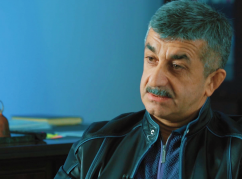

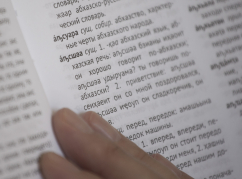
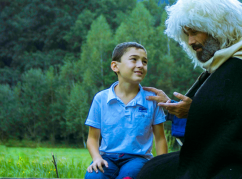
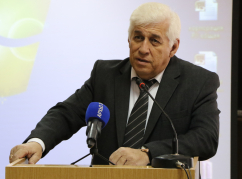
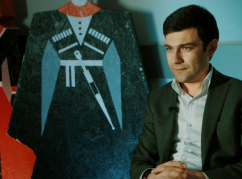
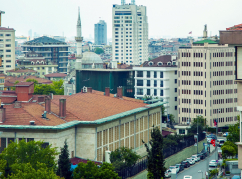
to login or register.